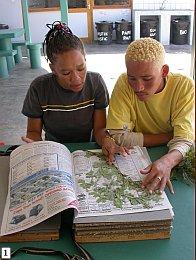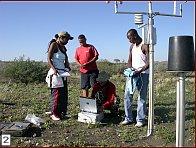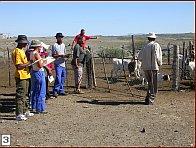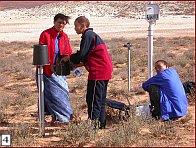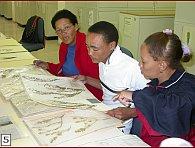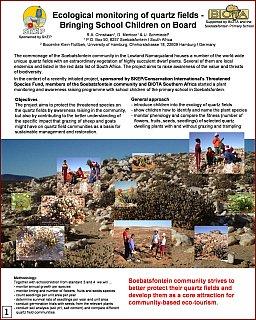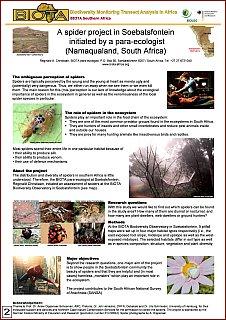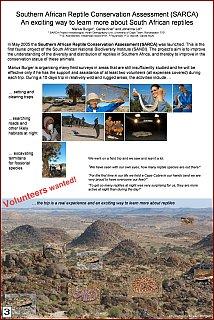 



Weather data
A large number of automatic weather stations has been implemented in the frame of the BIOTA AFRICA project by the Namibian National Botanical Research Institute (NBRI) and the Group "Biodiversity, Evolution and Ecology" (BEE) of the University of Hamburg. The website offers hourly updates of data and graphs of a large number of weather parameters.

|
BIOTA Southern Africa - Para-Ecologists
Exhibition on the eight para-ecologists |
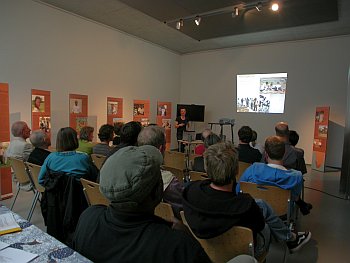 |
The Loki Schmidt House in the Botanical Garden of the University of Hamburg presents an exhibition on the para-ecologists of BIOTA Southern Africa. Within this exhibition the eight para-ecologists introduce their activities with texts and photos.
Also, the documentary on the deforestation in northern Namibia "Wiza Wetu! Our Forest!" is shown. From about August we will screen the film "Bridging the Gap. Para-ecologists in Action" which has been produced by the para-ecologists in May 2009.The exhibition will be open until 15 October 2009.
|
During the opening speech on the World Day to Combat Desertification, the 17 June 2009.
(Photo: BIOTA AFRICA)
|
Botanical Garden of the University of Hamburg
"Loki Schmidt House"
Ohnhorststrasse 18
D-22609 Hamburg
Phone: +49 (0)40 42816-440
Opening hours: Tue-Sat 1 pm-5 pm, Sun 10am-5 pm
|
CBD COP-9 Bonn |
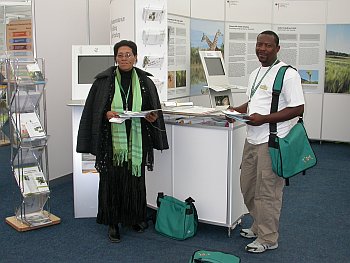 From 18th of May until 7th of June 2008, the BIOTA para-ecologists Ms Marianna Lot from Paulshoek / South Africa and Mr Robert S. Mukuya from Rundu / Namibia paid a visit to Germany. The two para-ecologists were invited by the German Federal Ministry of Education and Research (BMBF) to present the perspective of land users on biodiversity research and sustainable use of biodiversity in Southern Africa at the BIOTA AFRICA side event on the 28 May 2008 during the CBD COP-9 in Bonn. The side event has been webcast and can be viewed at the BIOTA AFRICA homepage. During their three weeks in Germany, Marianna and Robert used the opportunity to learn more about culture, biodiversity research, nature and nature conservation in Germany.Beyond the COP-9 side event, Marianna and Robert attended the international seminar held by Katholischer Akademischer Ausländer-Dienst (KAAD, Catholic academic Exchange Service) where they also presented to the 26 African post-graduate students the BIOTA para-ecologist program. Robert also travelled to Marburg to discuss the BIOTA South film for awareness raising on illegal logging and unsustainable forest management (Wiza Wetu! Our Forest!) with students of the Institute for Co-operation in Developing Countries.Photo (BIOTA AFRICA/ Ute Schmiedel): The para-ecologists Marianna Lot and Robert Mukuya at the booth of the German Ministry of Education and Research at the COP-9 in Bonn.
 Webcast of the side event (Video)
Webcast of the side event (Video)
|
Media |
Para-ecologists an asset in the Knersvlakte"This & That (CapeNature Newsletter) May 2008" |
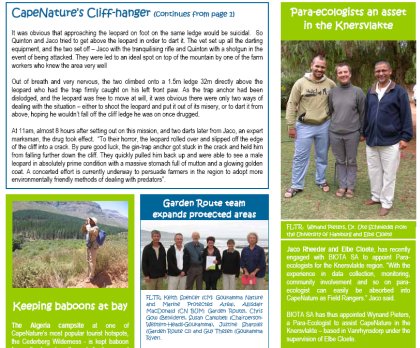
|
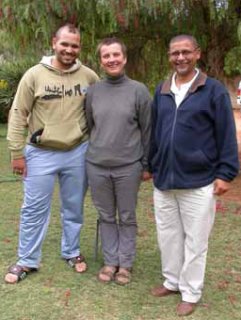 (f.l.t.r.: Wynand Pieters, Dr. Ute Schmiedel from the University of Hamburg and Elbe Cloete) (f.l.t.r.: Wynand Pieters, Dr. Ute Schmiedel from the University of Hamburg and Elbe Cloete)
|
Jaco Rheeder and Elbe Cloete have recently engaged with BIOTA Southern Africa to appoint BIOTA Paraecologists for the Knersvlakte region. BIOTA Southern Africa has thus appointed Wynand Pieters, a Para-Ecologist to assist CapeNature in the Knersvlakte -- based in Vanrhynsdorp under the supervision of Elbe Cloete. Click on image on the left hand side to download as PDF-File.
Click on image on the left hand side to download as PDF-File. |
Arid Zone Ecology Forum conference |
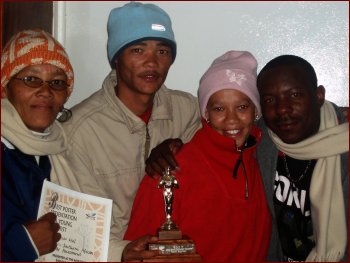 At the South African Arid Zone Ecology Forum conference (Weblink) in Kamieskroon in
August 2006 two para-ecologists have been awarded prizes for their presentation.
The South African para-ecologist Gerda Kriel won the award for Best Poster by a Young Scientist for her poster presentation on "Southern African Reptile Conservation
Assessment (SARCA): An exciting way to learn more about South African reptiles".
The South African para-ecologist Johanna (Marianna) Lot won a Merit Award for her
contribution to the oral presentation on "Para-ecologists - new perspectives for long-
term ecological research and land-user communities?"
Photo: Johanna (Marianna) Lot (left) and Gerda Kriel (third from left) having
received the awards, together with two of their proud colleagues. |
Training |
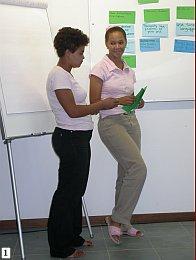  The training courses for para-ecologists comprise technical (e.g. work with computers, digital cameras, GPS, maps), methodological (e.g. collect and identify plants and animals, conduct vegetation surveys and interviews with land users) and soft skills (dealing with misunderstandings and miscommunication, social envy, social and cultural differences and conflicts that may arise from these). The para-ecologists support the field work of natural scientists (botanists, zoologists, soil scientists) as well as anthropologists, social and economic scientist. During the long periods of absence of the academic researchers, the para-ecologists keep up the regular monitoring activities (e.g. rainfall, soil properties, activities of selected animal groups, plant phenology, livestock numbers), continue the coordination of participative projects (e.g. restoration experiments, activities with schoolchildren), maintain the research equipment, facilitate the communication between the land- user community and the absent researchers and keep the researchers up to date regarding the progress of their work and changes in the natural environment or in the community. |
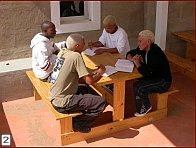 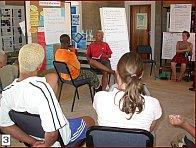 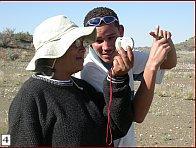 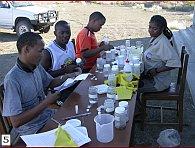 |
 Para-ecologists giving presentation during training course Para-ecologists giving presentation during training course Group work during training course Group work during training course Para-ecologist at role play during training course Para-ecologist at role play during training course Para-ecologist at training course Para-ecologist at training course Para-ecologist at training course 2005 Para-ecologist at training course 2005
|
Media |
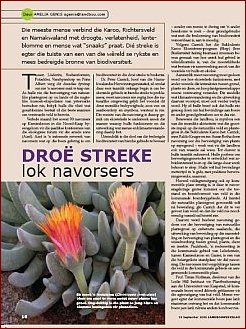 ...The para-ecologist project - which was initiated in Namibia, Richtersveld and the Namaqualand by Dr. Ute Schmiedel from the German research network BIOTA AFRICA in 2004 - is another success story. Para-Ecologists live in areas where the research is conducted. They are taught how to monitor biodiversity, to support researchers and to facilitate the communication between researchers and communities. The animated presentation of Mrs Marianna Lot, a para-ecologist from Paulshoek, was one of the highlights of the conference (annual meeting of the Arid Zone Ecology Forum in Kamieskroon, August 2006, to learn more about the conference read the full article by Amelia Genis). The project gave her work, taught her much more about the veld and the environment and exposed her to different people and cultures. Moreover, the new level of understanding has given her self-confidence. She can also explain to her own community what the research is about and what the researchers do.Amelia Genis in Landbouweekblaad 15 September 2006, translated by Ute Schmiedel
|
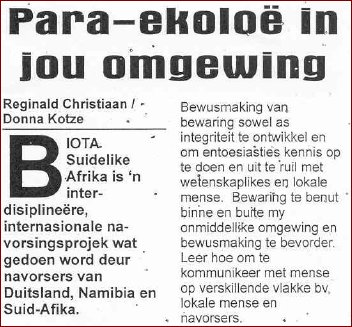 Para-ecologists in your neighbourhood
by Reginald Christiaan and Donna Kotze (BIOTA Para-ecologists)
The article in the local newspaper "DIE NAMAKWALANDER" written by the BIOTA para- ecologists aims to make BIOTA more known in the Namaqualand and to make people aware of the para-ecologist programme of BIOTA.
click on image on the left hand side to download as PDF-File ... Para-ecologists in your neighbourhood
by Reginald Christiaan and Donna Kotze (BIOTA Para-ecologists)
The article in the local newspaper "DIE NAMAKWALANDER" written by the BIOTA para- ecologists aims to make BIOTA more known in the Namaqualand and to make people aware of the para-ecologist programme of BIOTA.
click on image on the left hand side to download as PDF-File ...
|
|
|




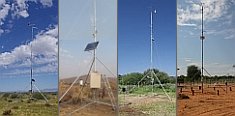

 Go to the WeatherNet
Go to the WeatherNet


 (f.l.t.r.: Wynand Pieters, Dr. Ute Schmiedel from the University of Hamburg and Elbe Cloete)
(f.l.t.r.: Wynand Pieters, Dr. Ute Schmiedel from the University of Hamburg and Elbe Cloete)
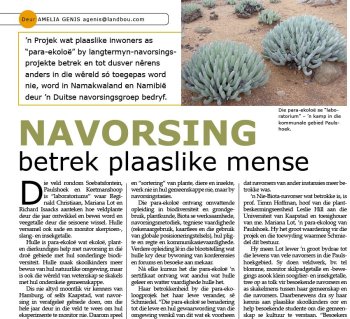
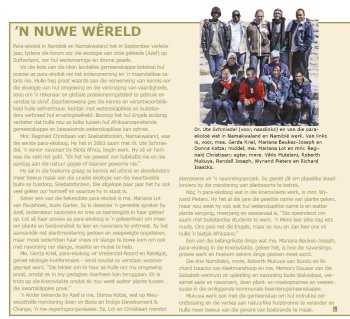

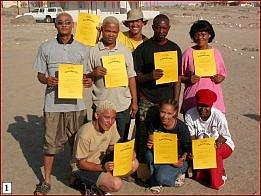
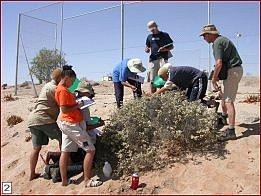
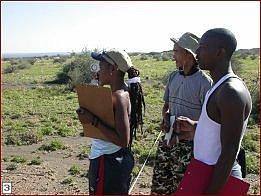
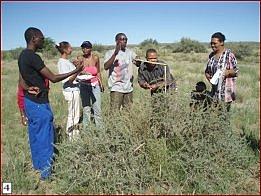
 Para-ecologist at first training course at Gobabeb
Para-ecologist at first training course at Gobabeb Para-ecologist at training course 2004
Para-ecologist at training course 2004 Para-ecologist at training course 2005
Para-ecologist at training course 2005 Para-ecologist at training course 2006
Para-ecologist at training course 2006




 Para-ecologist at training course 2005
Para-ecologist at training course 2005